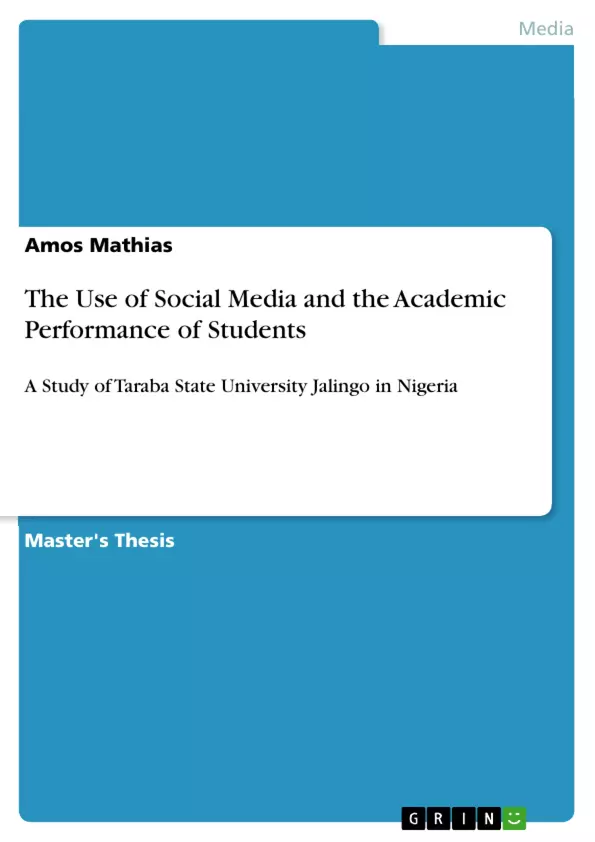The thesis aims at exploring the use of social media to improve students’ academic performance in Nigeria. The study is guided by the interpretivist theoretical perspective which follows a qualitative approach. The findings reveal that Taraba State University students have access to social media, but there is no official social media platform to build learning communities for the improvement of students’ academic performances in the university.
In recent times, institutions of higher learning around the world are exploring various technologies that encourage active learning. One of such technologies is the use of social media in building learning communities. Learning communities have assisted students’ learning process by means of collaboration, sharing of ideas and information in their respective subject areas. This is in accordance with the benefits of mobile technologies and ubiquitous computing, internet of a thing and emerging technologies such as web 2.0 and social networking that has captivated the attention of students globally. It is this development that has triggered this research on use of social media to improve students’ academic performance in Nigeria.
The study is guided by the interpretivist theoretical perspective which follows a qualitative approach. The case study method and triangulation sampling are employed for indept data collection. Interviews, online survey and observation are used as sources of primary data collection. Constant comparative analysis method is used to analyse the data. Social media has become an integral part of people’s life as this technology enables people to network with friends and associates, share photographs, generate contents, interact in games and real time conversations. The ever-increasing proliferation of mobile technologies has increased the use of social media, more especially in universities where the technology is transforming the way students communicate, collaborate, interact and learn.
Table of Contents
- Dedication
- Acknowledgment
- Abstract
Objectives and Key Themes
The main objective of this research is to investigate the use of social media to improve students' academic performance at Taraba State University, Jalingo, Nigeria. The study employs a qualitative approach to explore the relationship between social media usage and academic success within this specific context.
- The role of social media in fostering learning communities.
- The impact of social media on students' academic performance.
- The accessibility and usage of social media among Taraba State University students.
- The potential of social media platforms to enhance academic learning.
- Recommendations for implementing social media strategies to improve academic outcomes.
Chapter Summaries
Abstract: This research explores the use of social media to enhance student academic performance at Taraba State University, Jalingo, Nigeria. Utilizing a qualitative approach and interpretive theoretical perspective, the study employs interviews, online surveys, and observations to gather data. The findings suggest a lack of official social media platforms designed to build learning communities within the university, despite student access to social media. Google+ is proposed as a potential solution to facilitate the development of such learning communities for improved academic performance.
Keywords
Social media, social media in education, academic performance, learning community, higher education, Nigeria, Taraba State University.
Frequently Asked Questions: Social Media and Academic Performance at Taraba State University
What is the main focus of this research?
This research investigates the use of social media to improve students' academic performance at Taraba State University, Jalingo, Nigeria. It employs a qualitative approach to explore the relationship between social media usage and academic success.
What are the key objectives of the study?
The study aims to understand the role of social media in fostering learning communities, its impact on academic performance, the accessibility and usage of social media among students, the potential of social media to enhance learning, and to recommend strategies for improving academic outcomes using social media.
What methodology was used in this research?
The research utilizes a qualitative approach. Data collection methods included interviews, online surveys, and observations.
What are the key findings of the research?
The findings indicate a lack of official university social media platforms designed to build learning communities, despite student access to social media. The study suggests that platforms like Google+ could be used to facilitate the development of such learning communities.
What are the key themes explored in this research?
Key themes include the role of social media in education, the impact of social media on academic performance, the creation of learning communities through social media, and the accessibility and usage of social media in higher education within the Nigerian context (specifically, Taraba State University).
What are the key words associated with this research?
Social media, social media in education, academic performance, learning community, higher education, Nigeria, Taraba State University.
What is included in the provided document preview?
The preview includes a table of contents, a statement of objectives and key themes, chapter summaries (including the abstract), and a list of keywords.
What is the proposed solution to improve academic performance using social media?
The research suggests the implementation of a platform like Google+ to create official university-supported social media spaces for learning community building.
- Quote paper
- Amos Mathias (Author), 2019, The Use of Social Media and the Academic Performance of Students, Munich, GRIN Verlag, https://www.grin.com/document/457838



